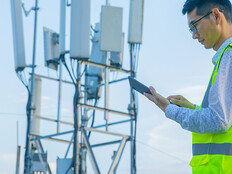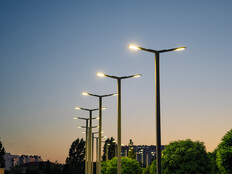Cities Embrace Smart Parking to Make the Best Use of Space
We all know parking can sometimes be a nightmare. In downtown Los Angeles, a vibrant commercial and residential neighborhood teeming with office buildings, restaurants, retail stores and entertainment options, parking can be a notoriously difficult endeavor.
Five years ago, to ease the parking struggle, the city installed smart parking technology that allows drivers to check a mobile app, website or call 511 for real-time availability and cost of parking spaces along a 4.5-mile stretch of downtown. The city also installed a dozen electronic message signs letting motorists know where to find available parking.
To detect whether spaces are open or occupied, the Los Angeles Department of Transportation embedded wireless sensors on 6,300 parking spaces and in some city-owned parking lots. The parking management software tabulates occupancy data and parking meter transaction data, then automatically analyzes the information, alerting transportation officials and allowing them to charge different prices based on demand, location and time of day.
“People that park regularly get savvy and know where they can find bargains,” says Peer Ghent, project manager for LA Express Park, the city’s intelligent parking management system. “To be candid, many people who go downtown are not aware of anything we did, but they benefit from it. If there’s more parking because we raised the price, they are happy because they can find a parking spot. And if they find something cheaper, they are happy too.”
The Overlapping Benefits of Smart Parking
Communities are beginning to embrace the smart cities movement, in which government agencies use technology to enhance citizen services; this can include reducing crime, improving energy efficiency and promoting more efficient parking. Besides Los Angeles, other cities that have implemented smart parking initiatives include Ocala, Fla., Norwalk, Conn., and the San Francisco suburbs of Redwood City and San Mateo.
By providing a smartphone app that shows available parking spaces, cities decrease the amount of cars cruising the streets, trying to find open spots. That, in turn, reduces traffic congestion and lowers air pollution, says Mark Zannoni, research director for smart cities and transportation at IDC Government Insights.
Furthermore, by using demand-based pricing, cities can increase revenue by raising parking meter prices in busy neighborhoods. And for less busy areas, cities can lower parking meter rates to incentivize people to park in those locations, boosting foot traffic and helping businesses, Zannoni says.
LA Looks to Expand Parking Initiative
In Los Angeles, LA Park Express uses smart parking technology from several companies. In its initial downtown project, which was paid for with $15 million in federal grants and $3.5 million in city funds, the transportation department installed wireless sensors underneath parking spaces. The company built a mesh network that gathers the data from the sensors and wirelessly transmits the information to the city’s parking management software, Ghent says.
In late 2015, the city expanded smart parking to the Westwood neighborhood. There, they used technology from a different company, where the embedded sensors communicate wirelessly with individual parking meters, and the parking meters transmit both the occupancy and payment data through a cellular network.
In each case, the city’s parking management software grabs the collected data and integrates the information in its own database.
The parking management software uses a pricing algorithm to make cost recommendations. The transportation department uses that information to set prices during three daily time slots. According to Ghent, the midday hours of 11 a.m. to 4 p.m. see the highest demand for parking.
The city aims to fill 70 to 90 percent of parking spaces in any given day. If occupancy is over 90 percent during a time slot, transportation officials will increase prices to up to $6 an hour. If occupancy is lower, officials will drop prices to as low as 50 cents per hour in some locations. Prices are adjusted monthly.
Overall, Ghent says, LA Park Express has been highly successful. The city has seen average occupancy rates during enforcement hours rise from 57 percent to 70 percent. It’s also seen a 2.5 percent increase in revenue. At the same time, the city has lowered the average parking meter price from about $1.90 to $1.65 an hour.
In fact, because of its success, the city is currently deploying the smart parking technology in its Hollywood neighborhood and has plans to expand it to Venice Beach, the University of Southern California, and the Los Angeles Memorial Coliseum area.
“The technology provides us the best of all worlds. We get better utilization of the spaces, we’ve lowered the average price to consumers and we get a slight increase to revenue, even though the revenue increase wasn’t our objective,” Ghent says. “It was to better utilize underutilized spaces and provide better availability of overutilized spaces, and we’ve done that.”









